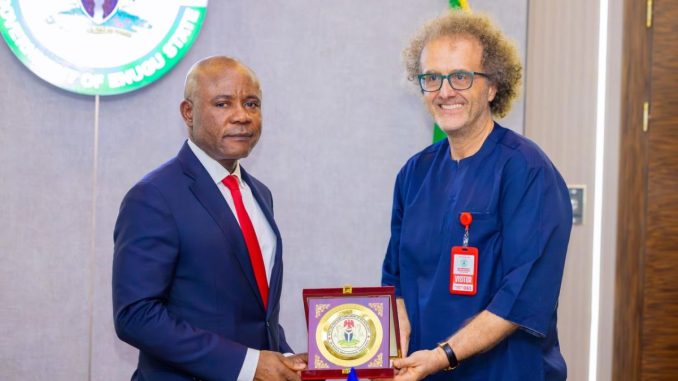
The European Union (EU) and the Enugu State Government are committed to exploring potential partnerships in the power and infrastructure sectors, aiming to spur economic growth and development within the state.
This announcement was made by Mr. Massimo De Luca, the Head of Cooperation at the European Union Delegation to Nigeria and ECOWAS, during a working visit to the governor of Enugu State, Dr Peter Mbah, at the Government House in Enugu on Tuesday.
Mr. De Luca highlighted the significance of Enugu State to the EU, noting that it has emerged as a key partner in various initiatives, especially in the power sector. Projects such as solar-to-health and small hydro-power generation aimed at providing a consistent power supply for industrial clusters are currently being developed.
“A specific focus that has emerged over the past few years is renewable energy, and Enugu is among a select number of states partnering with us on several renewable energy initiatives, including solar-to-health,” he explained.
“We are facilitating the electrification of primary healthcare centres in the state, adopting a model that ensures sustainability,” he added.
While discussing their infrastructure development blueprint, the EU chief expressed regret that some previous projects have gone to waste due to inadequate maintenance and lack of local interest.
However, he emphasised the importance of engaging local authorities in security matters to ensure that projects effectively reach rural communities.
“This time, we are fully involving local authorities in the primary health sector, alongside the private sector, so that the infrastructure we deploy in partnership with the state will be managed in a way that guarantees long-term sustainability. This means the solar installations we are constructing should benefit not only the health centres but also the wider ecosystem,” he stated.
He expressed optimism that the partnership would yield projects enhancing the efficiency of the primary healthcare system and providing better services to citizens.
“We are also exploring various types of renewable energy initiatives, particularly those linked to agriculture. The small hydro technology, in which the European Union excels, can be implemented without harming the environment and contributes to the electrification of the area with its own hydro-generating plants,” De Luca noted.
In his speech, Governor Peter Mbah affirmed the state’s strong interest in developing partnerships with the EU, stressing that many of its initiatives align with his administration’s objective of not only exponentially developing the state but also actively combating poverty.
“Our vision is to eradicate poverty – achieving a zero per cent rate in our poverty headcount. In pursuit of this goal, we have made significant investments in our social sector, such as building 260 smart schools and 260 Type-2 primary healthcare centres.
“There is clear alignment in our discussions about investment because, beyond poverty eradication, we aspire to grow our economy exponentially with support from foreign investments – both from multi-lateral and bi-lateral relationships.
“Given our private sector backgrounds, we understand how to structure investments in a win-win manner for all parties, whether with the private sector or EU investments.
“We are also keen on exploring areas you’ve mentioned. The grassroots aspect is particularly important to us as we believe we cannot prosper at the expense of our most vulnerable citizens, especially those in rural areas.
“Our budget tagline reflects our commitment to ‘exponential growth and inclusive prosperity’, meaning we must uplift even the weakest among us. Thus, we are heavily investing in basic amenities and expanding economic opportunities for rural communities,” he remarked.
Mbah further called for strengthening the existing relationship to explore new interests in renewable energy, including solar-for-health and solar-for-education, which will power smart screens, ICT centres, and artificial intelligence laboratories in the 260 smart green schools across the state’s electoral wards.


